Neck Deep talk Billie Joe, Big Sky and big gigs
"It's not your generic pop-punk"

Introduction
With a bagful choruses and Duracell Bunny energy levels , Neck Deep appear to be an unstoppable force. We talk to the first UK band to put the ‘popular’ in pop-punk...
Currently the UK’s finest pop-punk exports - and one of the first to make a genuine impact on both sides of the Atlantic
It's February in Manchester, which according to weather maths is not a good confluence of time and location. As students pick their way through pavement puddles outside, we're sat in the city’s biggest Academy venue talking to two men of a considerably sunnier disposition.
Matt West (aka West) and Sam Bowden are guitarists with Neck Deep, currently the UK’s finest pop-punk exports - and one of the first to make a genuine impact on both sides of the Atlantic.
Tonight’s show marks the Wrexham band’s largest sold-out headline gig yet. It’s also the closest thing to a home gig they’ll have on this current world tour and, as such, the cider-tanged iron box that is the Academy 1 holds a lot of memories for both players.
“One of the stage guys here, I used to serve in Game when I was working there,” laughs the bearded and bespectacled West. “Now it’s like, ‘You’re kind of working for me now, eh!?’ He used to bring a ferret in all the time, just in his coat!”
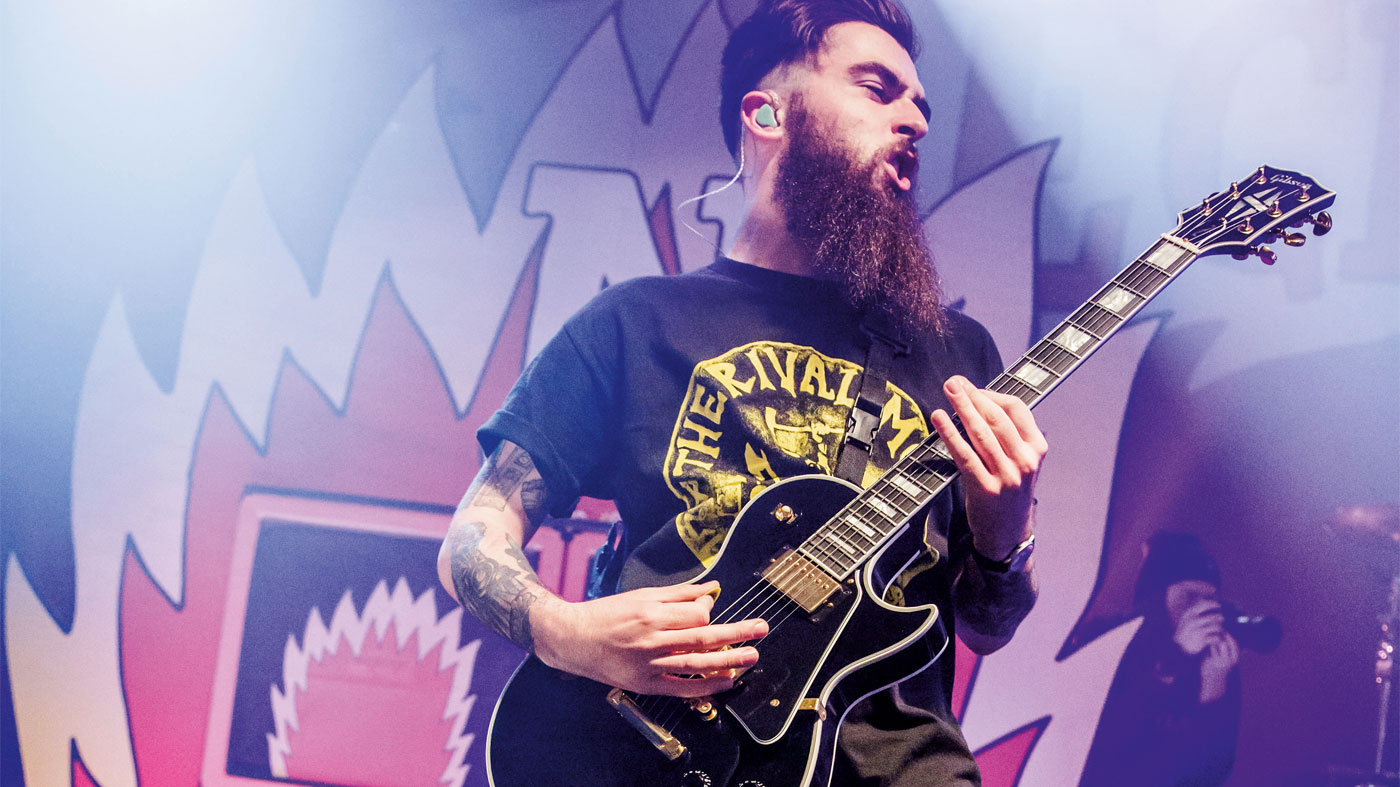
Home-coming kings
Tonight’s show is unarguably the most sentimental on the run. Along with the ferret smugglers, friends and loved ones will be in attendance in droves and it’s a significant milestone for a band that have been through major ups and downs in the last 12 months.
They're the latest in a proud tradition of UK bands repackaging US music and selling it back to them
“Everyone’s families are going to be here,” anticipates West between sips of a celebratory ale. Sam - cleaner cut, but gruffer-voiced - backs-up the sentiment with stats. “We’ve got 136 people on our guest list!”
It is a ludicrous figure. 136 is a successful show in its own right for many bands. Since forming as a spin-off from West’s old hardcore band, Spires, in 2012, Neck Deep have been on one hell of a roll.
They’ve released two albums - most recently last year’s Life’s Not Out To Get You - to spark sold-out shows across the US, as well as main stage sets at Reading/Leeds, and support slots with Bring Me The Horizon at Alexandra Palace and All Time Low at Wembley.
They are a UK band threatening to carve out the type of pop-punk success story that’s usually the preserve of imported US acts. The latest in a proud tradition of UK bands repackaging US music and selling it back to them.
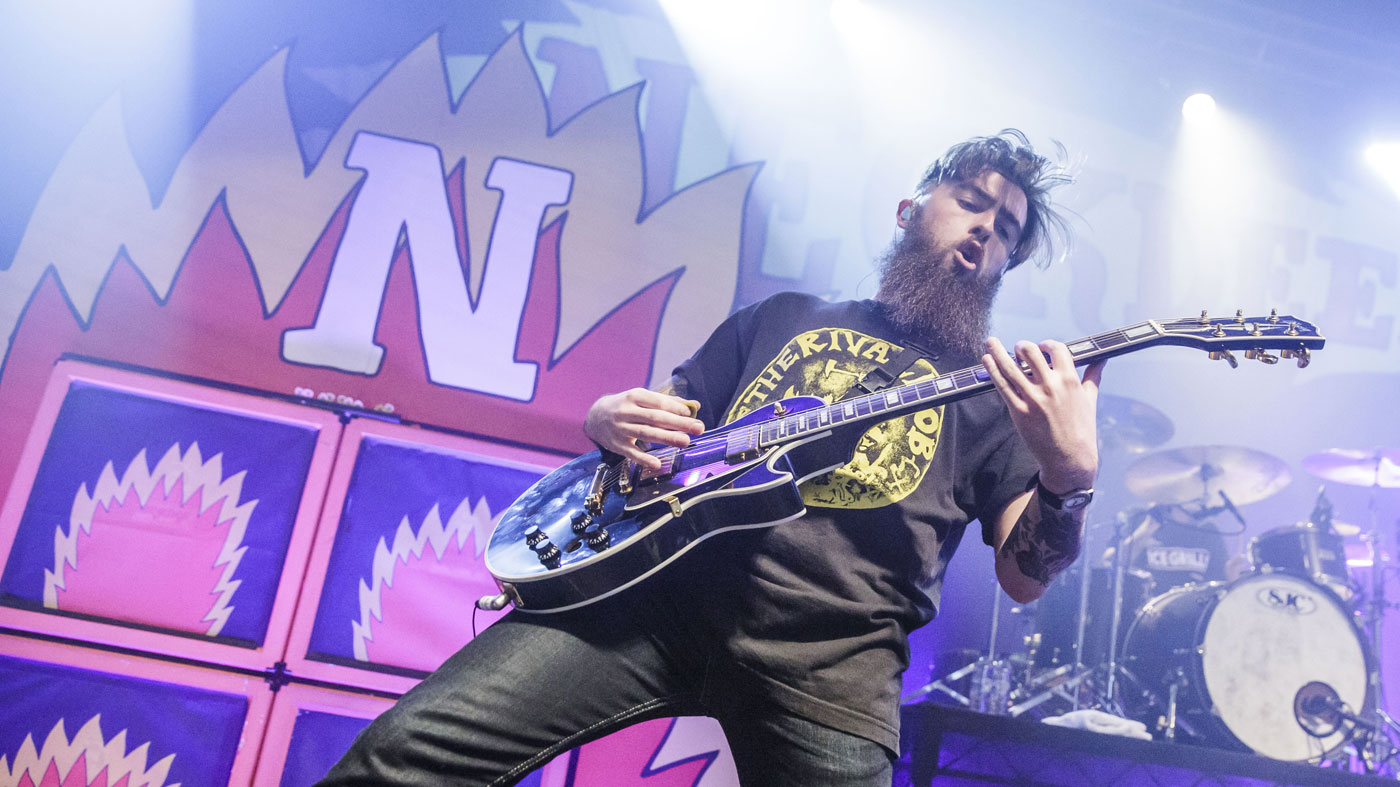
The Billie Joe Show
“For me, it was Green Day [that started it],” recalls West. “I remember seeing the Minority video on Kerrang! TV.
“It was the first time that I’d heard a band and just thought, ‘I want to know everything about this.’ I had a Behringer Strat copy and I tried to make it look exactly the same as Billie Joe’s Blue, but it looked awful!”
You’d see all these super-serious bands, but it just looked like a laugh, what the pop-punk bands were doing all the time
For Sam it was an early encounter with a Blink-182 clip that had a similar impact. In both player’s cases it’s notable that it was a video, not a record, that woke them from their pre-punk slumber.
“I think, more than anything, it was just how fun it looked,” reckons West. “You’d see all these super-serious bands, but it just looked like a laugh, what the pop-punk bands were doing all the time.”
“Off-stage, too,” adds Sam. “It was like ‘What they’re doing, I want to do!’” Which West sums up as, “Dicking around!”
Now we can all get on our high horses at this point and groan about the vapid nature of pop-punk bands, but from the Fab Four to Led Zep and the entirety of the Rolling Stones varied career, British bands have long made ‘dicking around’ an art form.
Like early rock music, pop-punk does not take itself too seriously - instead it’s about connecting with people by picking up a guitar and behaving like a loon.
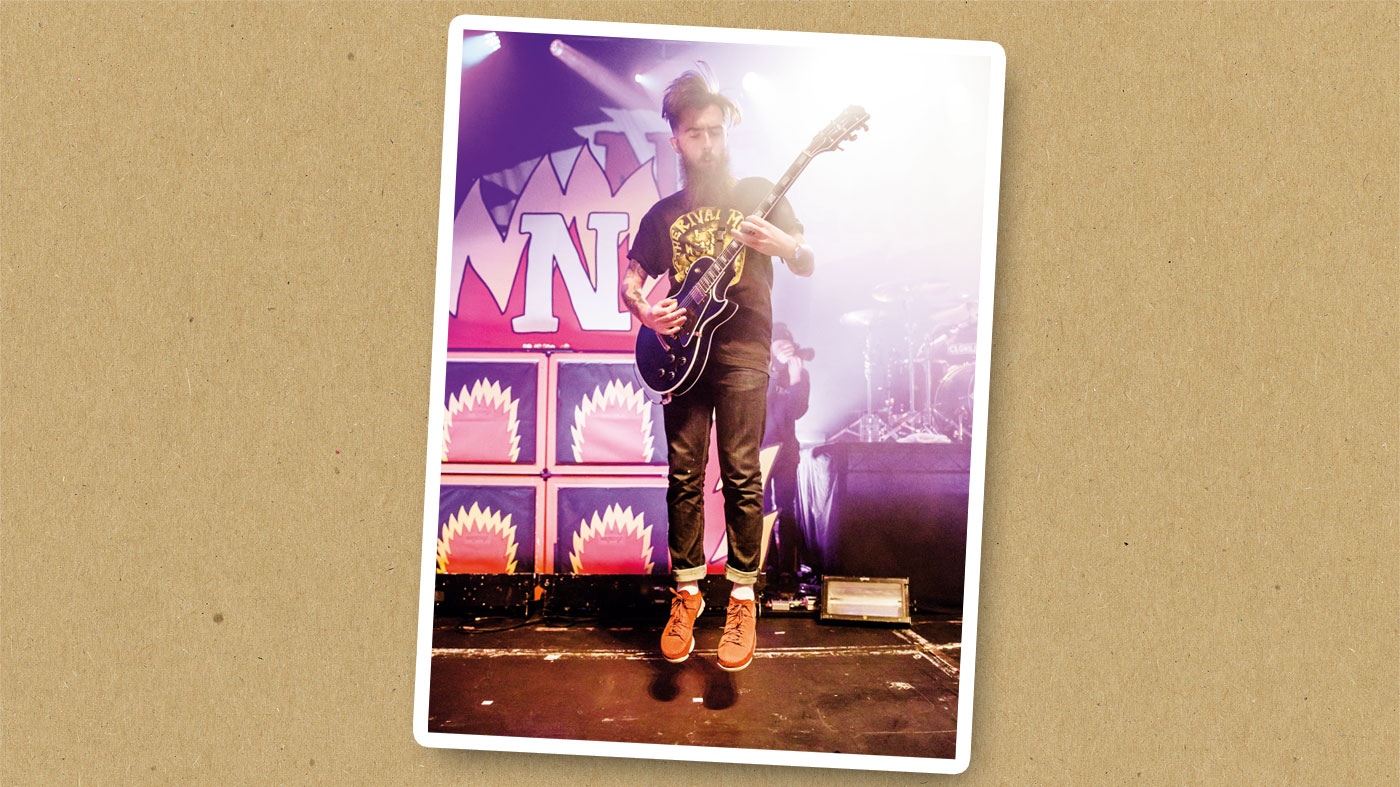
Heavy pop
“When I saw Billie Joe play, I was like ‘That’s obtainable. I could play like that!’” says West.
“That for me was a big thing, because I’m not the most technical guitarist, I’m not going to be sweep-picking behind my head while I do a knee-slide. I just thought, ‘If he can do it, I can.’”
Sam and West are reflective of a generation that grew up when the tribal lines between punk, alt-rock and metal were suddenly erased
“It goes wider than pop-punk,” adds Sam. “Foo Fighters was a big one for me and I would go through anything heavy up to like Slipknot. That was it for me: ‘heavier things’. I liked the darker side of it, too.”
“There was no gateway,” continues West. “I was into Green Day and then I saw a Killswitch [Engage] video on TV and I got really into them. [Even though] it was a stark contrast between the two.”
In this way, Sam and West are reflective of a generation that grew up when the tribal lines between punk, alt-rock and metal were suddenly erased. The resulting sound is still hook-heavy, but places increasing emphasis on the latter part of the equation.
“It is quite a polished sound,” says Sam. “But it’s got layers and it’s got darker progressions in some places. It’s not your generic pop-punk.”
“We use more of a metal-y tone live than on the album,” explains West. “We take the Mick out of [tour mates] State Champs all the time and tell them they use ‘Dad crunch’! I’m using a Kemper [Profiling Amp] live now and until two or three weeks ago I was just using a Killswitch patch that someone had created from one of their albums.”
“And the other preset on the other Kemper, which I’ve been using for a while, was a 6505!” adds Sam. “I’ve just changed over to using Orange though, so I’m using an actual analogue amp and pedals again.”
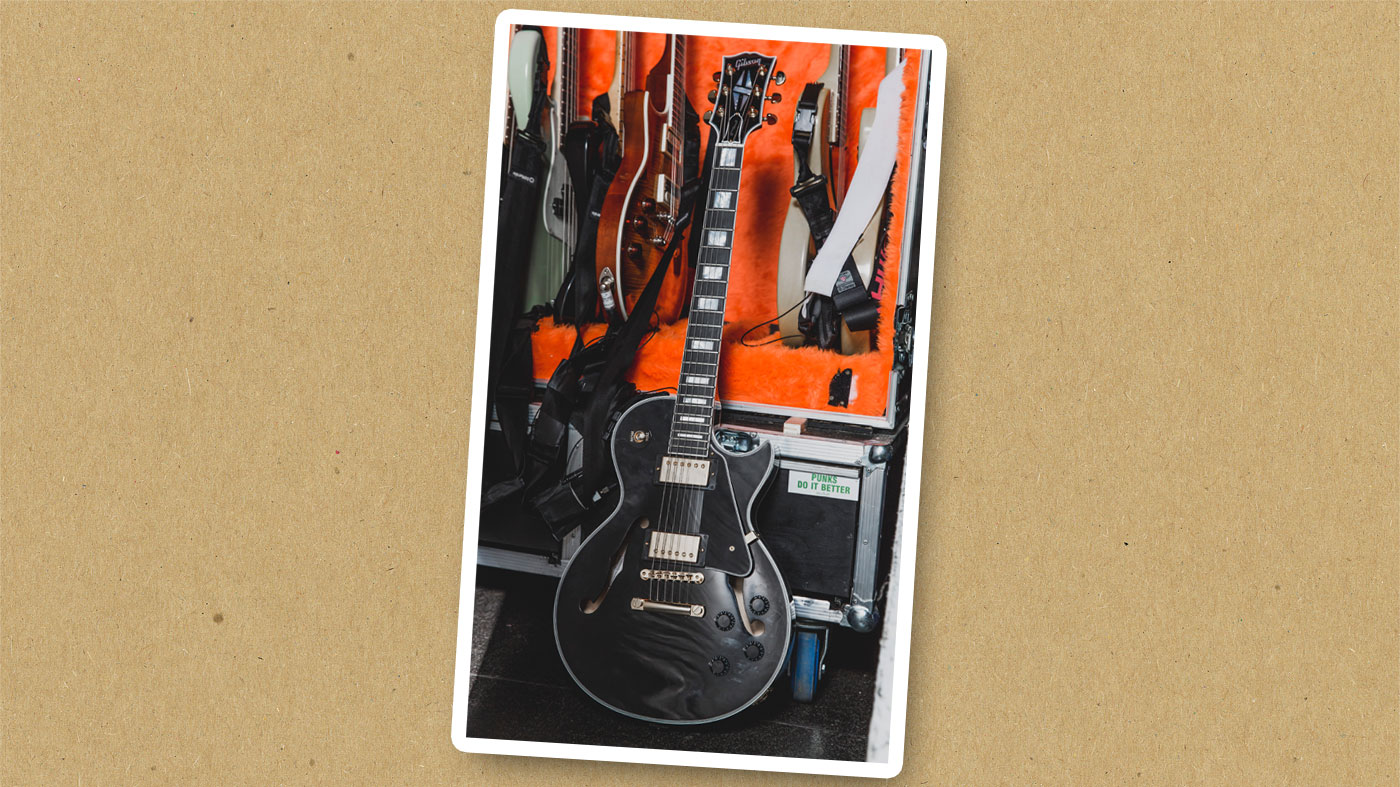
Half Tower Of Power
Punk types are often stereotyped as having a utilitarian approach to gear, and while West is quite adamantly aligned with this philosophy, Sam is a self-confessed gear obsessive - happily indulging in discussion of his shiny new Strymon Timeline and Big Sky pedals.
Get it onstage, get it plugged-in and stop worrying!
“Those are the ones!” he enthuses. “They sound insane and you can do so much with them. I unboxed them in December and I was like, ‘What have I done!?’ I spent the entire day on just one pedal and then the next day on the other one.
“I want to be able to go to a pedal and think, ‘Can I create this sound?’ and be able to do that. Otherwise, you’re just twisting knobs and hoping for the best.”
West is not having any of this, however. “Nah, just get it onstage, get it plugged-in and stop worrying! The Kemper weighs nothing. I can fly it around the world and the sound is always consistent from it.
“I just have a rhythm channel, a clean channel and then this weird swell noise, kind of like a butchered Electro-Harmonix Freeze pedal, that we just use to fill gaps between songs.”
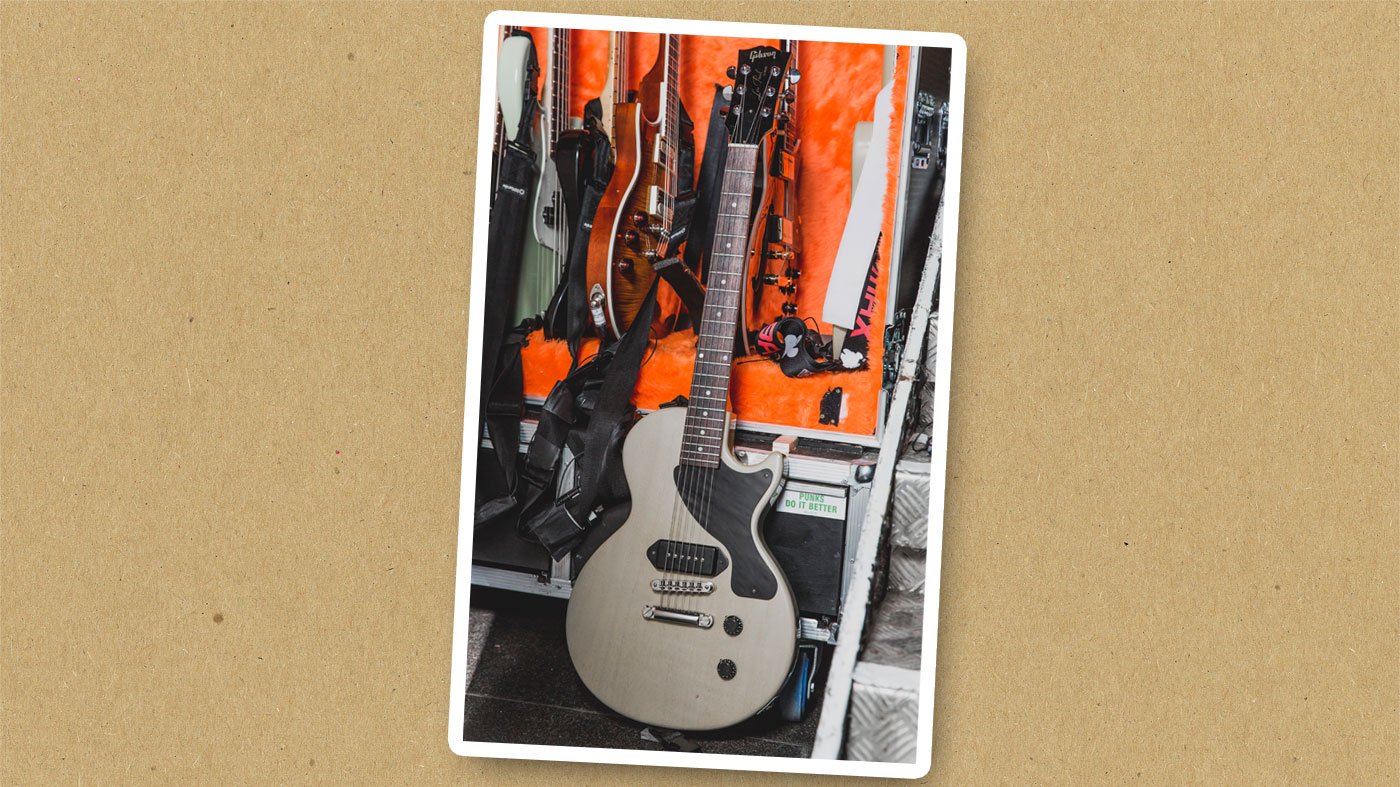
Gibsons and ESPs
Things continue in this vein on the guitar side. West’s a non-nonsense Gibson type, currently favouring a Les Paul Jr - “Like Billie Joe from Green Day,” he smiles, once again ticking the Armstrong box - and a ES-Les Paul hollowbody.
“With the Les Paul Juniors, it’s just the ease of it,” he says. “One knob, one pickup, you can’t go wrong.
“With the Les Paul Juniors, it’s just the ease of it,” he says. “One knob, one pickup, you can’t go wrong. Then the ES, I love Les Pauls, but the only thing that ever put me off it was the weight. This doesn’t weigh anything and it feels amazing to play.”
“It sounds insane,” acknowledges Sam, himself an ESP man. “I’m left-handed, so that’s a nightmare for buying guitars. I remember when I first got the black LTD Eclipse being like, ‘This is everything I want: it plays great, it’s the right shape and it’s a great touring guitar, too.’ I don’t want to change. Though I did take the EMGs out and put Seymour Duncans in…”
“But that’s the thing with the Gibsons for me,” chips in West. “That pickup sounds amazing and you don’t need to change anything on it. It’s a completely different approach to you!”
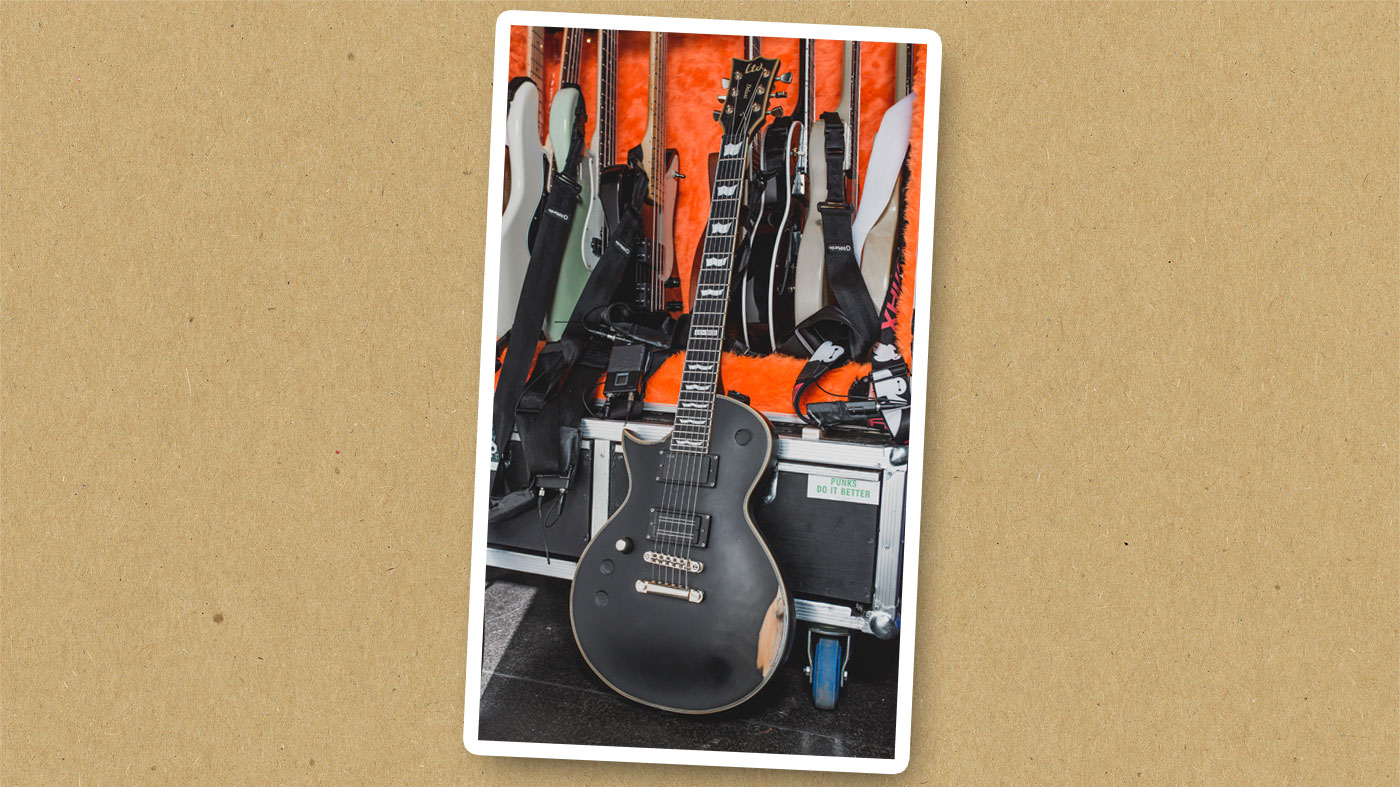
Six-string swapover
To hear them chat, you’d assume the pair had been playing together for years, but Sam - previously the band’s guitar’s tech - actually parachuted in last November after founding guitarist Lloyd Roberts’ departure.
It’s something that should never happen to anybody
Roberts, who featured in Total Guitar’s initial interview with Neck Deep two years ago, stepped down in October 2015 following allegations that he engaged in inappropriate communications with a fan. The guitarist took the accusations to the police himself, who found no case to answer, but Roberts did not rejoin the group.
It’s difficult to talk about Sam joining Neck Deep without bringing up the difficult circumstances surrounding Lloyd’s decision to permanently leave the band, and for the first time in our conversation we’re met with an awkward silence. It’s understandably still an uncomfortable subject.
“It was just a tough time for everybody,” West emphasises after a long pause. “It’s something that should never happen to anybody. One person heard one thing and then, out of there it grew grossly out of proportion and people just latched on to an idea that is clearly not true. It’s just a difficult subject for everyone really.”
For Neck Deep, this was not in the fairytale story, and the weeks surrounding these events must have felt like a living nightmare.
“I used to guitar tech for Neck Deep,” explains Sam. “I filled in on tour back in March with All Time Low and I’m pretty good at gauging the vibe [in the band]. I would say there was a lot of concern for how the fans would take it. Not so much for the events that occurred but the line-up changes and how people would take that.”
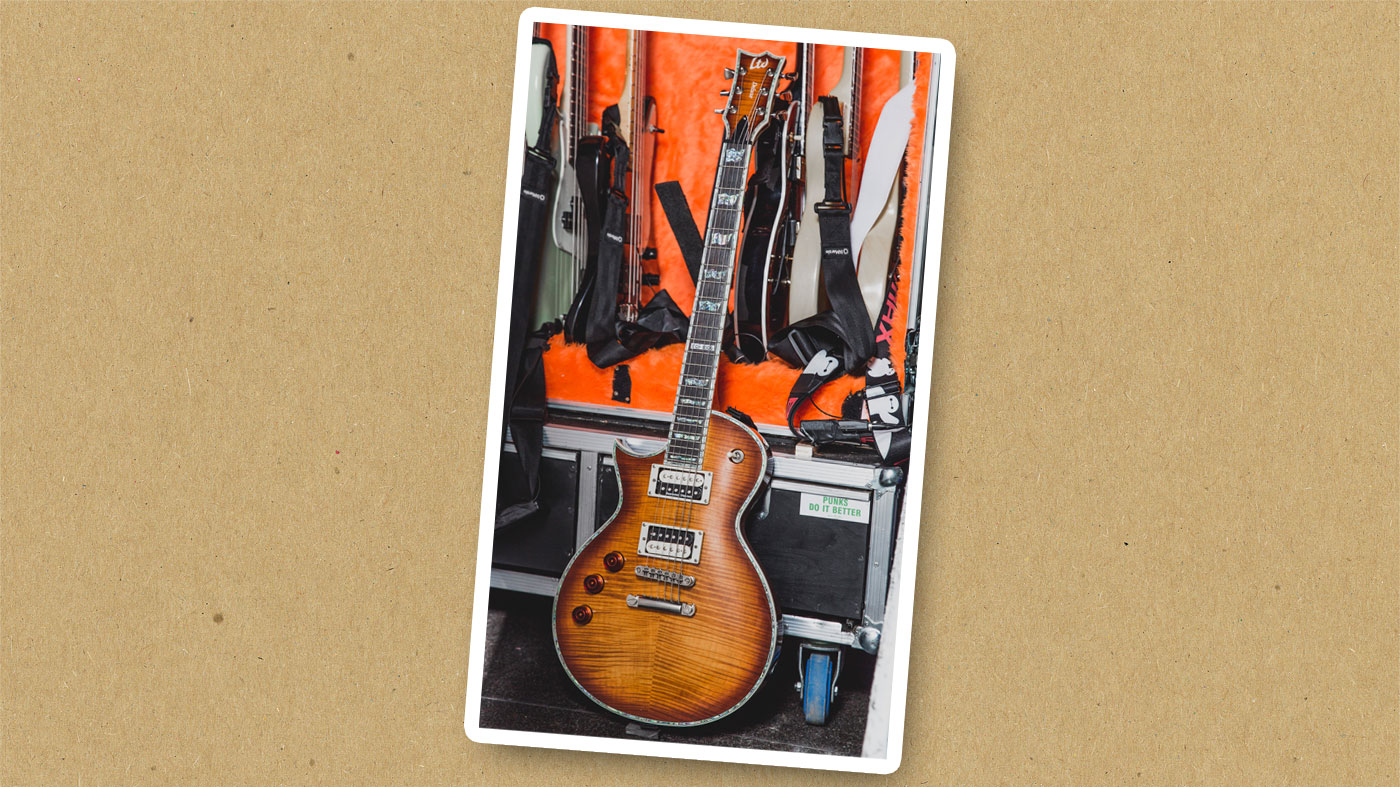
Into 'Deep
The concern was understandable, but let’s spare a thought for Sam in all this: a friend drafted in to learn a catalogue on a Sunday, support All Time Low in Edinburgh on Tuesday and then play the main stage at Reading on Friday.
“It was like, ‘Er, Sam, would you be able to learn 11 songs ready to play on Tuesday?’” he deadpans. “‘… Sound.’”
It was like, ‘Er, Sam, would you be able to learn 11 songs ready to play on Tuesday?’
For the first time in a while, West cracks a smile at the memory. “Edinburgh was fine,” continues Sam. “It was like 2,000 people.” “Which is still a lot of people,” adds West. “[But Reading] was definitely the biggest moment for me,” Sam continues.
“We were walking out to play the set and you could not see the end [of the crowd], it was just people. I remember turning around and looking at our manager and thinking, ‘What the fuck is going on?’ It was obscene.”
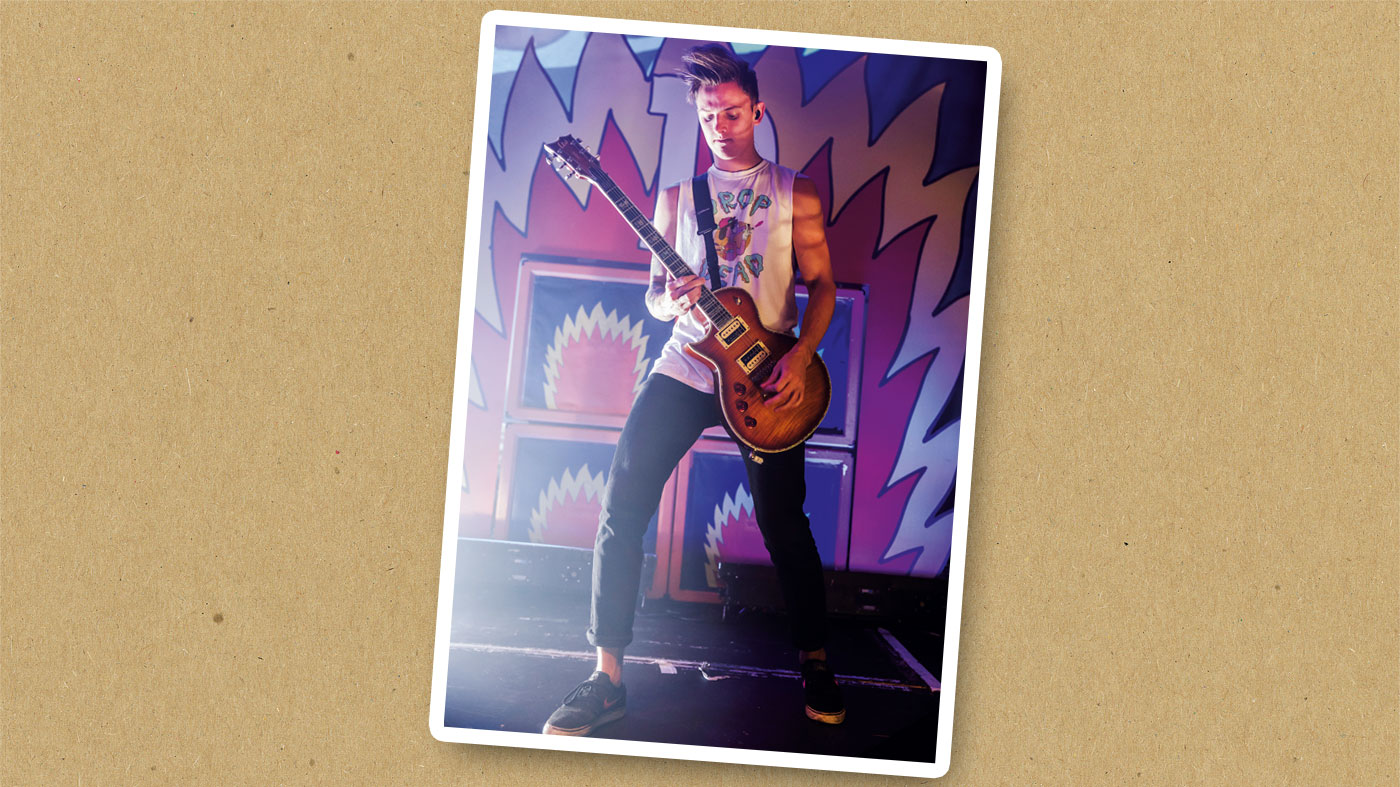
Making it official
And how did he feel about those first shows, given that the songs were still so fresh? “Well, I’d played those songs a lot,” responds Sam.
“But like West said earlier, a Neck Deep show is about having the energy. So it’s not just ‘Can you learn these songs?’ It’s ‘Can you learn these songs and go sick and put on a show?’”
He’d been a mate for years and it just didn’t seem right to get anyone else in
While Sam’s tenure with the band at this point started as a stop-gap, it seems it soon became clear that the best man for the job was already doing it.
“He’d been a mate for years and it just didn’t seem right to get anyone else in,” explains West. “Not even a week into the All Time Low tour, it just clicked for me and I thought, ‘We don’t need to even bother looking for anyone else.’ [Turns to Sam] I just kept you on tenterhooks, though!”
The confirmation came ahead of the band’s support slot with Bring Me The Horizon at Alexandra Palace. “It was a big show, 10,000 people, so I was a little bit nervous but I thought it would be fine,” explains Sam.
“Everyone was in the room and Ben [Barlow, vocals] gave me a card. I opened it and it said ‘Congratulations on the new job!’ I was like, ‘Flippin’ heck, I better not mess this up now!’”

Wishful Thinking
Fortunately, he’s not managed to yet. Indeed, the shared experiences and their rallying live performances seem to have made Neck Deep a stronger unit.
If you’d have told me two years ago that we’d sell-out Academy 1 in Manchester, I’d have called you a liar
The group have had a regular taste of mega show support slots and, with tonight’s sell-out a reminder of their own live pull, do they think a Wembley headline might be theirs for the taking some day?
“Who knows?” responds West. “Honestly, if you’d have told me two years ago that we’d sell-out Academy 1 in Manchester, I’d have called you a liar and walked away from you. I wouldn’t have believed it.”
The fact that we’re discussing the idea shows how far Neck Deep, and UK pop-punk as a whole, has come in a few short years - an arena show would be a crowning moment, indeed.
“We’d love to,” says West. “We know what we’re doing and we put on a good show. Our job, if you want to call it that - it’s not, it’s ridiculous - is to just stand on stage, have a laugh for an hour and see the world. It’s insane when you think of it!”
Ridiculous? Yes. Insane? Maybe. But the idea of a genuine, chart-threatening UK pop-punk band capable of matching their megastar US counterparts is clearly no longer just a pipe dream.
Matt is a freelance journalist who has spent the last decade interviewing musicians for the likes of Total Guitar, Guitarist, Guitar World, MusicRadar, NME.com, DJ Mag and Electronic Sound. In 2020, he launched CreativeMoney.co.uk, which aims to share the ideas that make creative lifestyles more sustainable. He plays guitar, but should not be allowed near your delay pedals.


